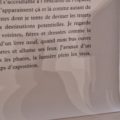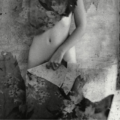Emancipated Galatea
It is sometimes oddly difficult to write about something that you have loved, that keeps inhabiting you, making you thrill and reflect. Three times now I have tried to write this text in different ways. Should I talk about this feeling of disarray that seems to occupy all of my body and my mind? I am writing from a time when it is no longer possible to attend shows after 8 pm in the evening. No longer it is possible to see halls full of impatient people, neither theaters teeming with a crowd charmed by artists applauding in unison or leaving disappointed by some promising show. In Paris, the lights turned off and the curtains are drawn at nightfall. We now sneak into the underground, always packed, worried about missing performances at 7 pm, 6 pm or even 5 pm… Theaters are gradually emptying, artists are getting injured, teams are getting tired. Autumn and its Festival look dreadful, the eye is ringed and the waking up after the governmental announcements, painful.
It is sometimes oddly difficult to write about something you have loved. I am afraid of wounding the memories. Of unfolding the wrong sentences. Words sometimes fail us… Images too. The first time I saw the performance Me Too, Galatée by Brazilian choreographer Pol Pi was on my computer screen. I watched few extracts, sometimes speeding up certain passages, intrigued, but almost bored. The myth of Pygmalion, everyone (or almost everyone) knows it! In the history and philosophy of art, the sculptor Pygmalion is the paradigm of Creation – or maybe more precisely the Creator. When this ancient myth is mentioned, I often think of Jean-Léon Gérôme’s painting: in the half-light of a studio, a sculpture, whose marble becomes flesh, leans towards its creator to kiss him passionately. In short, a woman was created by the hands of a man, fruit of his hard work and object of his desire. Pygmalion, everyone (or almost) knows him – Galatea, a little less. (1)
Thursday, October 15, 2020. It is a little after 9 pm, the Forum of the Centre Pompidou is gradually filling up with minds, warmed up by the inaugural conference by Paul B. Preciado. The philosopher’s seminar has just ended and the public is already gathering around the stage – or rather the arena – where two bodies will confront each other: a plastic mannequin against the transmasculine choreographer Pol Pi. Looking at his pixelated body through my screen, I missed something: the waiting, the sharing, the sensuality, the humor… And the unbearable fragility of a body that takes the risk to expose itself in the current context and in the middle of an institution that usually invisibilize “non-conforming” bodies, these “out of the ordinary” bodies, unclassifiable and unclassified. Here, at the Centre Pompidou, Pol Pi performs under the portrait of the former President Georges, as an ultimate nose-thumbing towards the institution and the former power.

Dionysian ritual or liberating catharsis? With his performance Me Too, Galatée, Pol Pi deconstructs with humor and sensitivity the feminine ideal, while denouncing the violence of beauty diktats and the male gaze. Like a distorted mirror, he places himself in front of a mannequin with standardized proportions. Naked, he exposes his body, his legs, his stomach, his buttocks… His sex? Between his legs, he places a cell phone with the camera turned on and towards the invasive audience. The crowd is also filmed and observed. Pol Pi takes his time and is not in a hurry. He plays the role of the statue after all… He sits on a pedestal, spreads his legs, and watches us look at him. The rite can begin.
From a basket of fruits and vegetables, Pol Pi makes a joyful ceremony and a gourmet costume. Necklaces of strawberries, bracelets of peppers, a mask of lettuce and a headdress of bananas… On the edge of the grotesque, each food item adorns Pol Pi’s body, giving it a more “feminine” aspect. These fruity prostheses are shared with the public. Because of Covid, this time it will not be real bananas that one can eat. (2) But the exchange is still there, between us and him: a communion. Sometimes complicit laughter. Mixed with hydroalcoholic gel, these organic elements remind the sexist lexicon used by certain men to speak about women as objects of consumption “that one devours with the glance”. This look, both inquisitive and lustful, is the symbol of patriarchal violence. The one we suffer here in France, but also (and above all) the one suffered in Brazil, the native country of the artist. Created in 2018, just before the election of President Jair Bolsonaro, this performance is the result of an urgency to speak up, to show himself, to resist. Through dance, through gesture, through community.
Faced with the intermingled words of men who claim to sculpt women’s bodies, Pol Pi states with conviction: “No, a man does not define me, my house does not define me, my flesh does not define me, I am my own home. “(3) It is the end of the performance and we would like to sing these words with him. To shout them. So that everyone can hear them. So that everyone knows Galatea. For all women and all minorities to come together. If we had to choose only one voice, it would be that of Pol Pi, our emancipated Galatea. It is a little after 10 pm and I am already drunk with this moment, which will cease to exist the next minute, the next day, the next week. I am drunk with this performance, by the overwhelming delicacy of Pol Pi and his audience, standing together, under the perplexed gaze of the old world. It is sometimes oddly difficult to write about what we have loved… We would like to tie each word with images engraved in our memory, with the diffuse sensations invading us, with the beauty of the moment. We can only write: “It was there, it was beautiful. “
(1) Related by Ovid in his "Metamorphoses", the myth of Pygmalion tells the story of the sculptor Pygmalion who falls in love with his own creation, a statue named Galatea.
(2) Pol Pi usually hands out real fruits to the audience, who is invited to eat it. In order to comply with health safety standards, the artist has replaced the food with plastic bananas.
(3) Lyrics of the song "Triste, Louca ou Má" de Francisco, El Hombre.






